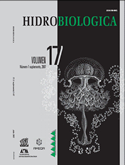Population dynamics of Brachionus calyciflorus and Brachionus havanaensis (Rotifera) on mixed diets with Microcystis aeruginosa and green algae
Palavras-chave:
Microcystis, algae, Rotifera, population growthResumo
The effect of the cyanobacterium Microcystis aeruginosa was evaluated as a diet, separately and together with one of the two edible algal species (Chlorella vulgaris or Scenedesmus acutus) at different proportions (0, 25, 50, 75 or 100% on the basis of biomass) on the population growth of two rotifers Brachionus calyciflorus and Brachionus havanaensis. Population growth curves of B. calyciflorus and B. havanaensis cultured on M. aeruginosa alone, or in combination with one of the two algal species decreased with increasing proportion of cyanobacteria in the diet. In treatments containing exclusive algal diets (either Chlorella or Scenedesmus) and those with low proportion of Microcystis, B. havanaensis was more abundant than B. calyciflorus. However, both rotifer species died in less than two weeks on an exclusive diet of M. aeruginosa. Peak population densities (mean ± standard error) of B. calyciflorus grown on an exclusive diet of Chlorella or Scenedesmus were 47 ± 6 and 15 ± 1 ind. ml-1, respectively. Corresponding values for B. havanaensis were much higher (203 ± 21 and 187 ± 2 ind. ml-1). Regardless of the rotifer species and the diet type and composition, the population growth rates (r) were inversely related to increasing proportion of M. aeruginosa in the diet.Downloads
Downloads
Publicado
Como Citar
Edição
Seção
Licença
Los autores/as que publiquen en esta revista aceptan las siguientes condiciones:
De acuerdo con la legislación de derechos de autor, HIDROBIOLÓGICA reconoce y respeta el derecho moral de los autores, así como la titularidad del derecho patrimonial, el cual será cedido a la revista para su difusión en acceso abierto.
Publicar en la revista HIDROBIOLÓGICA tiene un costo de recuperación de $500 pesos mexicanos por página en blanco y negro (aproximadamente 29 dólares americanos) y $1000 pesos por página a color (aproximadamente 58 dólares americanos).
Todos los textos publicados por HIDROBIOLÓGICA sin excepción se distribuyen amparados bajo la licencia Creative Commons 4.0Atribución-No Comercial (CC BY-NC 4.0 Internacional), que permite a terceros utilizar lo publicado siempre que mencionen la autoría del trabajo y a la primera publicación en esta revista.
Los autores/as pueden realizar otros acuerdos contractuales independientes y adicionales para la distribución no exclusiva de la versión del artículo publicado en HIDROBIOLÓGICA (por ejemplo incluirlo en un repositorio institucional o publicarlo en un libro) siempre que indiquen claramente que el trabajo se publicó por primera vez en HIDROBIOLÓGICA.
Para todo lo anterior, el o los autor(es) deben remitir el formato de Carta-Cesión de la Propiedad de los Derechos de la primera publicación debidamente requisitado y firmado por el autor(es). Este formato se puede enviar por correo electrónico en archivo pdf al correo: enlacerebvistahidrobiológica@gmail.com; rehb@xanum.uam.mx (Carta-Cesión de Propiedad de Derechos de Autor).
Esta obra está bajo una licencia de Creative Commons Reconocimiento-No Comercial 4.0 Internacional.


